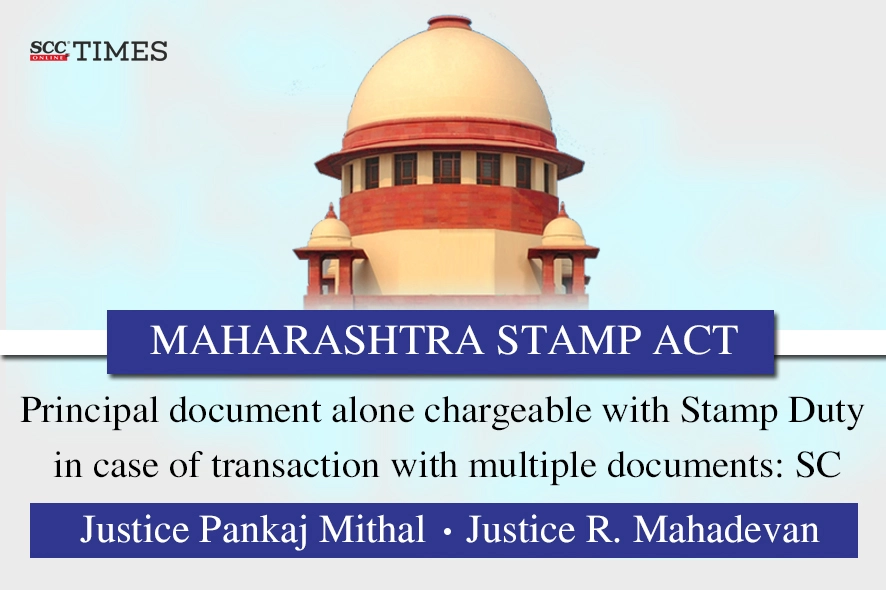Supreme Court: While considering the instant appeal wherein Bombay High Court’s decision to affirm Trial Court’s order of impounding six instruments for adjudication of stamp duty and penalty, the Division Bench of Pankaj Mithal and R. Mahadevan*, JJ., concluded that as per Section 4(2) of the Maharashtra Stamp Act, the parties were at liberty to parties to determine as to which of the document shall be principal document. The agreement for sale consisted of a clause whereby the possession was handed over to the purchaser satisfying the requirement to treat the instrument as conveyance and what remained was only the formality of execution of the sale deed. Therefore, the Court concluded that the agreement for sale was the principal document on which stamp duty was to be paid as per Article 25 of Maharashtra Stamp Act, 1958.
The Court also clarified that to determine the stamp duty that is chargeable upon an instrument, the legal rule is that the real and true meaning of the instrument is to be determined by ascertaining the intention of the parties from the contents and the language employed in the whole instrument and the description or the nomenclature given to the instrument by the parties is immaterial.
The Court further stated that for several documents to form part of a single transaction, there must be a transaction in furtherance of which several other documents are executed to complete that transaction and then it becomes imperative to charge stamp duty on the principal instrument/document.
Background and Legal Trajectory:
The appellants instituted a suit seeking declaration and injunction. Denying the plaint averments, the defendants filed their written statements. Thereafter, one of the defendant took out an application under Sections 33, 34 & 37 of the Maharashtra Stamp Act, 1958 r/w Section 17 of the Registration Act, to impound the six original agreements for sale produced by the appellants, so as to get them registered, on the premise that the said documents include a clause that the physical possession of the properties mentioned therein, was transferred to the purchasers; however, they were not duly stamped; and hence, the documents require the payment of stamp duty of the conveyance.
The Trial Court allowed the said application, thereby impounding the documents and sending the impounded instruments to the Collector of Stamp, Thane, for adjudication of stamp duty and penalty, if any, payable by the appellants. Aggrieved by the same, the appellants filed the writ petition, which was dismissed by Bombay High Court, by the impugned order.
Contentions:
The appellants contended that as per Section 4 of the Maharashtra Stamp Act, 1958, the agreements to sell in relation to the same immovable properties ultimately resulted into a sale deed in favour of the appellants and the said sale deed was also duly registered, upon payment of the required stamp duty and therefore, the prior agreements to sell are not required to be registered and stamped.
Per contra, counsel appearing on behalf of the respondents submitted that on a detailed analysis of the agreements to sell, wherein, there was a specific clause about the transfer of physical possession to the purchasers therein, the Courts below had rightly allowed the application filed for impounding these documents and, therefore, the same need not be interfered with.
Court’s Assessment and Findings
The Court was faced with the issue that whether the appellants were liable to pay stamp duty and penalty on the agreements to sell executed prior to the sale deed executed in their favour, in respect of two properties. To answer the question, the Court analysed the impounded documents and clarified the legal position vis-a-vis chargeable stamp duty on instruments.
The Court stated that Section 4(1) of Maharashtra Stamp Act, makes it clear that where several instruments are executed for completing a transaction, the principal instrument alone shall be chargeable with duty prescribed in Schedule I. The proviso makes it clear that the duty chargeable on the instrument so determined, shall be the highest duty which could be chargeable in respect of any of the said instruments forming part of the same transaction. Each of the other instruments are chargeable with a fixed duty. Furthermore, S. 4(2) also gives an opportunity to the parties to determine for themselves which of the instruments shall be deemed to be the principal instrument.
Upon reading the impounded instruments, the Court found that the instruments were not forming part of a single transaction between the same parties and they were different transactions between different vendors and purchasers.
The Court further clarified that the language used in Section 4 is very clear, whereby the stamp duty is on the instrument and not on the transaction.
Referring to Explanation 1 to Article 25 of Schedule I of the Maharashtra Stamp Act, the Court stated that the impounded agreements were not only between different parties but also were executed during different periods, by which time the Explanation I to Article 25 of Schedule I underwent a change. The words “without executing the conveyance in respect thereof” were deleted with effect from 17-08-1994 by Maharashtra Act 38 of 1994.
Furthermore, Explanation I makes it lucid that an agreement for sale is to be treated as a “conveyance” if either possession is handed over immediately or if it is agreed to be handed over within a particular time. A reading of Explanation I along with Section 4 makes it clear that the duty is levied only on the instrument and not on the transaction.
The Court found that in the documents, though there was a clause for conveyance between the vendors and purchasers in relation to the respective properties, the value of the properties were above Rs.100/- and there was also a clause by which possession was admittedly handed over on the date of the agreement, implying acquisition of possessory rights protected under Section 53-A of the Transfer of Property Act, 1882, which requires payment of proper stamp duty and registration as mandated under Section 17 of the Registration Act.
The Court rejected the appellant’s contention sale agreements ultimately concluded in the sale deed on which stamp duty was paid, stating that it would not by ipso facto absolve the primary liability of paying the appropriate stamp duty at the time of execution of the sale agreement as it was the principal document. Hence, S. 4 cannot aid the appellants.
The Court further recorded that further record that the second proviso to Article 25 only states that if the stamp duty is already paid or recovered on the agreement to sale, then the same shall be deducted while computing the stamp duty payable when the sale deed is executed; the proviso does not contemplate a situation similar to the instant case. Since, the state cannot recover by way of stamp duty in excess of what it is entitled to, the recovery shall be restricted only to the extent of difference in stamp duty and the entire penalty from the date of execution of the agreement for sale till the date of payment of stamp duty.
With the afore-stated assessment, the Court affirmed the decision of the Trial Court and High Court and dismissed the instant appeal.
CASE DETAILS
|
Citation: Appellants : Respondents : |
Advocates who appeared in this case For Appellant: For Respondent(s): |
CORAM :









Stamp Duty is paid on Development Agreement. Stamp Duty of only Rs.100 is applicable on Permanent Alternate Accommodation Agreement, as DA is treated as Principal Document and PAAA is treated as ancillary document to DA. My query is whether any Supplementary Development Agreement is liable for Stamp duty as the same also is an ancillary document to DA. Kindly advise.
Society founders members Stamp Duty applicable or not applicable at Time of conveyance deed